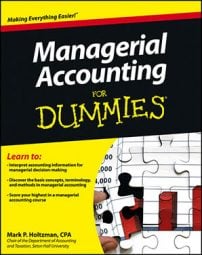

In the realm of budgets and costs, the budget should carefully designate which departments have authority over and are responsible for which costs. If a department has authority and responsibility for certain costs, those costs are called controllable costs. The noncontrollable costs are those costs that a department doesn’t have authority over and can’t change.
Because authority and accountability go together, you can only hold individuals and units in an organization accountable for those things that they can control. If you don’t give subordinates authority to do something, how can you hold them accountable for doing it?
Suppose Eve asked Alfred to walk her dog for a week. However, she refused to give Alfred the keys to her apartment, so he had no access to the dog. Because Eve didn’t give Alfred the authority to do his job, Eve can’t possibly hold him accountable for not walking the dog (or for the resulting mess in her apartment).
Given the organization’s goals and strategies, every required task and decision should be under someone’s watch. Responsibility accounting allows you to hold subordinates responsible for all tasks over which they have control.
Overhead allocations are usually inconsistent with the idea of controllable costs. Overhead allocations use allocation rates to assign overhead costs based on number of units, direct labor hours, or other cost drivers to individual departments. Each department must then include a portion of this overhead as a cost in its own budget, even though these departments usually have little or no say over how money is spent for this overhead.
Even when one of these departments closes completely, its overhead costs often remain and get assigned to other departments. In this way, arbitrary overhead allocations often result, forcing departments to accept responsibility for overhead costs that they have little or no control over — noncontrollable costs.
Mark P. Holtzman, PhD, CPA, is Chair of the Department of Accounting and Taxation at Seton Hall University. He has taught accounting at the college level for 17 years and runs the Accountinator website at www.accountinator.com, which gives practical accounting advice to entrepreneurs.